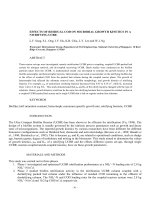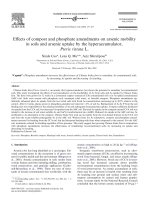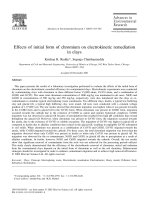Effects of breakwater on deposition-erosion process in access channel of Dung Quat thermal power plant
Bạn đang xem bản rút gọn của tài liệu. Xem và tải ngay bản đầy đủ của tài liệu tại đây (539.25 KB, 4 trang )
THE INTERNATIONAL CONFERENCE ON MARINE SCIENCE AND TECHNOLOGY 2016
Effects of breakwater on deposition-erosion process in access channel of
Dung Quat thermal power plant
Doan Thi Hong Ngoc, Pham Van Khoi
Vietnam Maritime University
Abstract
In harbour, not only has breakwater affected on the reduction of wave height but it also has
prevented sedimentation depositing in access channels. Hence, dredging volume each year will be
decreased. The content of this paper presents all natural factors that influence deposition-erosion
process in access channels, relying on calculating tool MIKE 21 to calculate deposition-erosion
volume in each factor. According to the input data, authors calculated the breakwater’s effects on
deposition-erosion process in access channel of Dung Quat thermal power plant. The results are
collected and compared in cases that have and have not the breakwater to affirm the sedimentation
preventing function of the breakwater in harbour.
Keywords: Breakwater, deposition, erosion, access channel.
1. Introduction
Estimately, the middle of Vietnam has a total coastline length of over 1000 km, where
residences and coastal economic zones most locate. In particular, Dung Quat Economic Zone
(Quang Ngai province) is important for the development of the deep-water port system at Dung
Quat Bay. Dung Quat Thermal Power Plant Project has been approved by the Government and
Quang Ngai province, which is under land clearance stage. Following the approved plan, the project
will establish a 3,5 km branch channel from national channels to the existing channel of Dung Quat
port, adding 1,3 km to the existing west breakwater that will be the coal port for 100.000 DWT
cargo ships [1].
So far, there is no specific research on the effects of the breakwater on sediment in access
channel. The purpose of this paper presents the natural elements affecting the deposition - erosion
in channels and calculates the access channel at Dung Quat Thermal Power Plant under the
influence of prolonged breakwater. The calculated results give the most accurate estimated volume
of the sedimentation over time.
2. Originations impact deposition-erosion process in access channels
According to [3], access channels are designed to ensure that the width and depth are safe
for ship navigating. However, the slope of the access chanels can be eroded or deposited because of
two main reasons:
- The impact of pure flow;
- The impact of flows and waves.
It is easy to understand that the causes of erosion are the flows and waves that impact on
slope and sedimentation movement, but the eroded volume of slope is usually smaller than
deposited one.
Moreover, the phenomenon of sedimentation will affect the harbour navigating depth for the
vessels, which also is a significant issue with all access channels in Vietnam.
Sediment in access channels can be categorized as below:
- Bottom sediment: sediment moves closely to the river bottom in the form of rolling,
sliding, jumping motion; it’s velocity is different from the flow velocity;
HỘI NGHỊ QUỐC TẾ KHOA HỌC CÔNG NGHỆ HÀNG HẢI 2016
329
THE INTERNATIONAL CONFERENCE ON MARINE SCIENCE AND TECHNOLOGY 2016
- Suspended sediment: sediment moves in the water for a long time, it’s velocity is similar
to the flow velocity.
3. Choosing calculation tools
Currently, the world is using some computational models of hydraulics, such as:
- HEC - RAS model (HEC- River Analysis System), the Association of American military
engineers built it to simulate river systems;
- MIKE model developed by DHI Water & Environment;
- Delft - 3D model developed by Hydraulics Institute of Delft, the Netherland;
- ISIS model developed by Halcrow company and Wallingford university.
Dung Quat Bay is a hydrological and hydraulic system influenced by the natural elements
and artificialities. Calculated area is a small area under the influence of both hydrological factors
and combination construction. Therefore, the most appropriate tool is 2-D hydraulics model to
simulate the hydrodynamics for this area.
With the goal of simulating and calculating the effects of breakwaters on access channels in
Dung Quat Thermal Power Plant, author selected MIKE 21 software, for it meets the following
criterias:
- Being a multi-function set of modular software;
- Tested with actual projects over the world;
- Providing hydraulic calculations with high accuracy;
- Satisfying the purpose of the research;
- User-friendly.
MIKE 21 basic equations [2]
Continuity equation:
u v w
+ +
=S
(1)
x y z
Moment equation in the x and y direction:
u
t
v
t
+
+
u 2
x
v 2
y
+
+
vu
y
vu
x
+
+
wu
z
wv
z
= fv - g
x
= - fu - g
-
y
1 pa
0 x
-
-
1 pa
0 y
g
0
-
p
x
z
g
0
z
dz + Fu +
p
y
u
vt
+ us S
z z
dz + Fv +
v
vt + vs S
z z
(2)
(3)
Where: t- time; x, y and z- coordinate Cartesian; f = 2Ωsin - Coriolis parameter; v t vertical viscous mess; S - the magnitude of the flow due to the orriginal points; (u s, v s )- velocity of
flow going into realms; Fu , F v -the terms horizontal stress.
Sediment transport module MIKE 21 ST [2]
Mike 21 ST, the calculating module of sediment transport, is determined by 5 theories:
+ Engelund and Hansen’s theory of total sediment transport;
+ Engelund and Fredsøe’s theory of total sediment transport;
+ Zyserman and Fredsøe’s formula of sediment transport;
+ Meyer-Peter and Müller’s theory of total sediment transport;
+ Ackers and White’s formula of total sediment transport.
4. Calculation results
Input data model MIKE 21: topography; geology; wind (wind storms, wind seasons);
hydrology.
HỘI NGHỊ QUỐC TẾ KHOA HỌC CÔNG NGHỆ HÀNG HẢI 2016
330
THE INTERNATIONAL CONFERENCE ON MARINE SCIENCE AND TECHNOLOGY 2016
100000
90000
80000
70000
60000
50000
40000
30000
20000
Bathymetry [m]
Above
0
-10 0
-20 - -10
-30 - -20
-40 - -30
-50 - -40
-60 - -50
-70 - -60
-80 - -70
-90 - -80
-100 - -90
-110 - -100
-120 - -110
-130 - -120
-140 - -130
Below -140
Undefined Value
10000
0
-10000
-20000
-30000
-40000
0
20000
40000
0:00:00 12/30/1899 Time Step 0 of 0.
60000
80000
100000
Figure 1. The topography of this
area
Figure 2. Topography and grid of access
channels
Wind directions:
- Windstorm: hurricanes reach the shore in any directions, selected particular direction
(causing the highest wave) and the other directions on two sides, namely: 18o, 48o, 78o, 108o, 348o;
- Seasonal wind: directions depending on wind graphic in the working area, two
representative velocities chosen are 9 m/s and 14,9 m/s; the wind directions are selected as the
directions of seasonal wind blowing from the sea, which is capable of causing large waves: 18 o,
45o, 90o, 315o.
Table 1. Factors causing deposition-erosion process in access channels
Total volume
Low tide
Direction
315o
Direction 90o
Direction 45o
Direction 18o
Velosity 14,9 m/s
Direction
315o
Direction 90o
Direction 45o
Direction 18o
Direction
348o
Direction
108o
Direction 78o
Direction 48o
Direction 18o
Velosity 9 m/s
Causing
flow
High tide
Causing season wind
Causing storm wind
Calculation steps: the input data model wave parameters in access channels depositederoded sedimentation volume in access channels (within 1 year).
The total sedimentation volume in access channels at the port of Dung Quat Thermal Power
Plant [1] is calculated in two cases, the extended western breakwater (1,3 km) the one without the
extension to identify the effects of breakwater on deposited - eroded access channel obviously.
Calculated results show that:
+ The deposition - erosion volume with storm waves are negligibly compared to the season
waves and currents due to the very short time impact;
+ The volume by seasonal waves: the deposition volume in case with breakwater is larger
than the other;
+ The volume by flow: the deposition volume in case with no breakwater is larger than the
other and dominates the access channels;
+ The total amount of deposition volume with no breakwater is more than the other with
average thickness of 0,64 m.
HỘI NGHỊ QUỐC TẾ KHOA HỌC CÔNG NGHỆ HÀNG HẢI 2016
331
THE INTERNATIONAL CONFERENCE ON MARINE SCIENCE AND TECHNOLOGY 2016
Number
Table 2. Total volume in two cases
No sketching
Kind of sediments
breakwater (m3)
With sketching
breakwater (m3)
1
By storm wind
-2.970
-2.055
2
By season wind
36.946
95.810
3
By flow
685.576
28.441
719.552
122.196
Total
Figure 3. Comparison of two cases
5. Conclusion
Theoretically, this paper presents the origin of sediment and the factors cause deposition and
erosion in access channels, beside argumenting and showing the reasons for choosing the MIKE 21
model to calculate the quantity of deposition-erosion volume.
In term of calculations, the authors performed calculations determining deposition-erosion
volume in a year with no breakwater and with added breakwater, hence, proposing
recommendations to build the sketching breakwater to reduce the dredging volume annually,
ensuring the technical requirements with access channels.
References
[1]. Doan Thi Hong Ngoc.Research the effects of breakwater on deposited-eroded access
channel of Dung Quat Thermal Power Plant. Thesis of Master course. Vietnam Maritime
University (VMU). 2015.
[2]. Dao Van Giang. Evaluation the effects of construction combo on the hydrodynamics in the
coasline and estuary of Cua Tung, Quang Tri province. Thesis of Master course, University
of Science, Vietnam National University (VNU). 2011.
[3]. Dao Van Tuan. Breakwaters and shore protection. Science and Technics Publishing House.
2012.
HỘI NGHỊ QUỐC TẾ KHOA HỌC CÔNG NGHỆ HÀNG HẢI 2016
332









